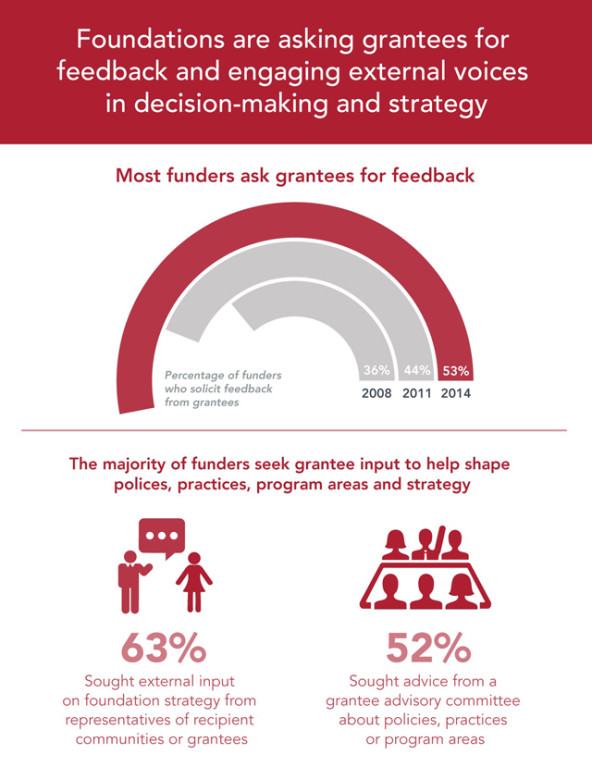Every three years Grantmakers for Effective Organizations conducts a national survey of staffed grantmaking foundations to track progress on practices that both nonprofits and grantmakers agree are critical to achieving better results. To make sure that we focused on funder practices most relevant to nonprofits, we invited a group of nonprofit leaders to give feedback on survey questions.
What stands out from our conversations over the past two years is that both nonprofit leaders and funders have a strong desire for healthier, more honest relationships. Among other signs, Yelp-like platforms such as Inside Philanthropy and Philamplify, which allow nonprofit leaders to rate their experience with grantmaking institutions, make it clear that nonprofits want to change the relationship with their funders.
To achieve ambitious goals, nonprofit leaders such as Gustavo Torres typically work with a variety of funders to support their work. Torres is the executive director of CASA de Maryland, an organization with nearly 100 full and part-time staff working to improve the lives of immigrants and low-wage workers in the Washington, DC region. He prizes funders who are flexible and responsive, something he’s found in working with the team at Open Society Institute’s Baltimore office. Torres says, “They really know how nonprofits operate and the challenges that we face. Because of the trust that we have been building for many years now, they know that if they allocate resources to our organization, we will invest it wisely.”
It’s also important for grantees to feel like they can communicate challenges. Torres shared, “We identify the crisis, and Open Society immediately asks us, ‘What do you need? How can we work together?’ It’s a true partnership. If we make mistakes, we communicate with them directly, and we say, ‘We thought we were going to do this, but listen, it is not working out.’ We immediately set a meeting to work out whatever it is. It creates this great opportunity for the two institutions to be a model of a very powerful relationship.”
Of the 637 staffed grantmaking organizations that participated in our study, virtually all of them said that having staff members build relationships with grantees in a way that allows grantees to be open about their challenges is important to their organization’s success. We also discovered that more and more foundations are putting practices in place to get feedback from their grantees:

To understand how these relationships and interactions can influence grantmaker practices that benefit grantees, we asked a series of questions, including:
- Does your staff have nonprofit experience?
- Do you have representatives from nonprofits on your board?
- Do you have representatives from the community on your board?
- Are there regular opportunities for grantees to give feedback?
- Do you assess the needs of the communities you’re serving?
- Do you share what you’re learning with grantees?
We found that funders more attuned to grantee needs tend to be particularly committed to providing two types of support: multiyear grants and capacity building. A core group of funders devote a substantial amount of their grant funding to these areas. In fact, we found that grantmakers attuned to grantee needs were twice as likely to provide a high degree of multiyear support and five times more likely to provide a high degree of capacity-building support.

Funders that have a deep knowledge of grantee needs intuitively understand why this type of support matters and are better prepared to stand with nonprofits as they take on systemic issues facing our communities. CASA de Maryland has received multiple grants from Open Society Institute that enable the organization to respond rapidly to needs in the community, including a two-year core support grant. Torres remarked, “It’s essential to have unrestricted and long-term grants, because it gives me the opportunity to be creative and ... to accommodate the needs of our community. Every six months to a year we have a different situation.”
For some funders, this may seem daunting. The foundation may have few staff or a grant load that makes it difficult to get through all the requests in time for the next grant cycle. As a former case manager who worked with 80-100 clients at any given time, I can sympathize. It’s hard to manage such a large number of relationships.
Nevertheless, every funder should ask what small steps they can take to improve their chances of hearing what our communities really need.
Support SSIR’s coverage of cross-sector solutions to global challenges.
Help us further the reach of innovative ideas. Donate today.
Read more stories by J McCray.

